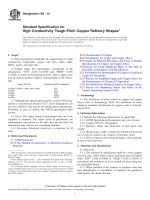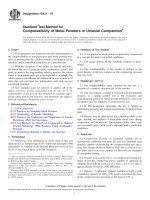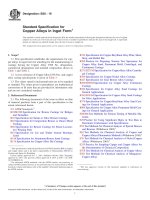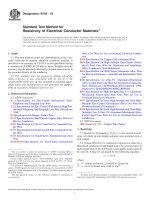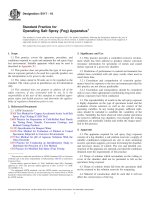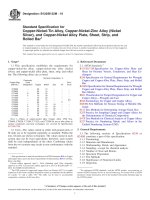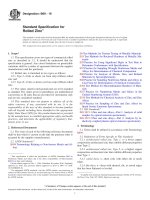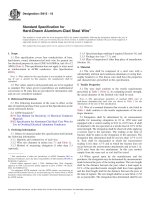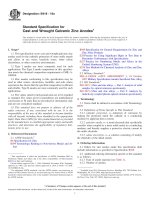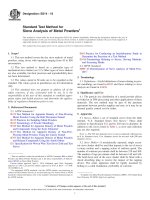Astm b 122 b 122m 16
Bạn đang xem bản rút gọn của tài liệu. Xem và tải ngay bản đầy đủ của tài liệu tại đây (105.93 KB, 6 trang )
Designation: B122/B122M − 16
Standard Specification for
Copper-Nickel-Tin Alloy, Copper-Nickel-Zinc Alloy (Nickel
Silver), and Copper-Nickel Alloy Plate, Sheet, Strip, and
Rolled Bar1
This standard is issued under the fixed designation B122/B122M; the number immediately following the designation indicates the year
of original adoption or, in the case of revision, the year of last revision. A number in parentheses indicates the year of last reapproval.
A superscript epsilon (´) indicates an editorial change since the last revision or reapproval.
This standard has been approved for use by agencies of the U.S. Department of Defense.
1. Scope*
2. Referenced Documents
2.1 ASTM Standards:3
B171/B171M Specification for Copper-Alloy Plate and
Sheet for Pressure Vessels, Condensers, and Heat Exchangers
B248 Specification for General Requirements for Wrought
Copper and Copper-Alloy Plate, Sheet, Strip, and Rolled
Bar
B248M Specification for General Requirements for Wrought
Copper and Copper-Alloy Plate, Sheet, Strip, and Rolled
Bar (Metric)
B601 Classification for Temper Designations for Copper and
Copper Alloys—Wrought and Cast
B846 Terminology for Copper and Copper Alloys
E8/E8M Test Methods for Tension Testing of Metallic Materials
E112 Test Methods for Determining Average Grain Size
E255 Practice for Sampling Copper and Copper Alloys for
the Determination of Chemical Composition
E478 Test Methods for Chemical Analysis of Copper Alloys
E527 Practice for Numbering Metals and Alloys in the
Unified Numbering System (UNS)
1.1 This specification establishes the requirements for
copper-nickel-tin alloy, copper-nickel-zinc alloy (nickel
silver), and copper-nickel alloy plate, sheet, strip, and rolled
bar. The following alloys are covered:
Nominal Composition, %
Copper Alloy
UNS No.2
Previously
Used
Designation
Copper
Nickel
Zinc
Tin
Chromium
C70600
C70620
C71000
C71500
C71520
C72200
C72500
C73500
C74000
C74500
C75200
C76200
C77000
...
...
6
5
...
...
...
1
9
3
2
8
4
90
90
80
70
70
85
89
72
70
65
65
59
55
10
10
20
30
30
15
9
18
10
10
18
12
18
...
...
...
...
...
...
...
10
20
25
17
29
27
...
...
...
...
...
...
2
...
...
...
...
...
...
...
...
...
...
...
0.5
...
...
...
...
...
...
...
NOTE 1—Plates of copper-nickel alloy Copper Alloy UNS Nos.
C70600, C70620, C71500, C71520, and C72200 for use as tube plates in
surface condensers and heat exchangers are covered by Specification
B171/B171M.
3. General Requirements
1.2 Units—The values stated in either inch-pound units or
SI units are to be regarded separately as standard. Within the
text, SI units are shown in brackets. The values stated in each
system may not be exact equivalents; therefore, each system
shall be used independently of the other. Combining values
from the two systems may result in non-conformance with the
standard.
3.1 The following sections of Specifications B248 or
B248M constitute a part of this specification:
3.1.1 Terminology
3.1.2 Materials and Manufacture
3.1.3 Workmanship, Finish, and Appearance
3.1.4 Sampling—except for chemical analysis
3.1.5 Number of Tests and Retests
3.1.6 Specimen Preparation
3.1.7 Test Methods
3.1.8 Significance of Numerical Limits
3.1.9 Inspection
1
This specification is under the jurisdiction of ASTM Committee B05 on Copper
and Copper Alloys and is the direct responsibility of Subcommittee B05.01 on Plate,
Sheet, and Strip.
Current edition approved April 1, 2016. Published April 2016. Originally
approved in 1939. Last previous edition approved in 2011 as B122/B122M – 11.
DOI: 10.1520/B0122_B0122M-16.
2
The UNS system for copper and copper alloys (see Practice E527) is a simple
expansion of the former standard designation system accomplished by the addition
of a prefix “C” and a suffix “00.” The suffix can be used to accommodate
composition variations of the base alloy.
3
For referenced ASTM standards, visit the ASTM website, www.astm.org, or
contact ASTM Customer Service at For Annual Book of ASTM
Standards volume information, refer to the standard’s Document Summary page on
the ASTM website.
*A Summary of Changes section appears at the end of this standard
Copyright © ASTM International, 100 Barr Harbor Drive, PO Box C700, West Conshohocken, PA 19428-2959. United States
1
B122/B122M − 16
3.1.10
3.1.11
3.1.12
3.1.13
3.1.14
6. Materials and Manufacture
Rejection and Rehearing
Certification
Test Report
Packaging and Package Marking
Supplementary Requirements
6.1 Materials:
6.1.1 The material of manufacture shall be a form (cast bar,
cake, slab, et cetera) of Copper Alloy UNS No. C70600,
C70620, C71000, C71500, C71520, C72200, C72500,
C73500, C74000, C74500, C75200, C76200, or C77000 of
such purity and soundness as to be suitable for processing into
the products prescribed herein.
6.1.2 When specified in the contract or purchase order that
heat identification or traceability is required, the purchaser
shall specify the details desired.
3.2 In addition, when a section with a title identical to that
referenced in 3.1, above, appears in this specification, it
contains additional requirements, which supplement those
appearing in Specifications B248 or B248M.
4. Terminology
4.1 For definitions of terms related to copper and copper
alloys, refer to Terminology B846.
NOTE 2—Due to the discontinuous nature of the processing of castings
into wrought products, it is not always practical to identify a specific
casting analysis with a specific quantity of finished material.
5. Ordering Information
6.2 Manufacture:
6.2.1 The product shall be manufactured by such hotworking, cold-working, and annealing processes as to produce
a uniform wrought structure in the finished product.
6.2.2 The product shall be hot or cold worked to the finished
size and subsequently annealed, when required, to meet the
temper properties specified.
5.1 Include the following specified choices when placing
orders for product under this specification, as applicable:
5.1.1 ASTM designation and year of issue,
5.1.2 Copper [Alloy] UNS No. designation,
5.1.3 Temper (Section 8),
5.1.4 Dimensions, thickness and width (Section 11),
5.1.5 How furnished: straight lengths or coils,
5.1.6 Quantity—Total weight or total length or number of
pieces of each size.
5.1.7 Type of edge, if required (slit, sheared, sawed, square
corners, round corners, rounded edges, or full rounded edges),
5.1.8 Length (Section 11), and
5.1.9 Intended application.
6.3 Edges:
6.3.1 Slit edges shall be furnished unless otherwise specified in the contract or purchase order.
7. Chemical Composition
7.1 The material shall conform to the chemical composition
requirements in Table 1 for the copper [alloy] UNS No.
designation specified in the ordering information.
5.2 The following options are available but may not be
included unless specified at the time of placing the order when
required:
5.2.1 Heat identification or traceability details,
5.2.2 Certification,
5.2.3 Test Report,
5.2.4 If product is purchased for agencies of the U.S.
government (see the Supplementary Requirements of Specifications B248 or B248M for additional requirements).
7.2 These composition limits do not preclude the presence
of other elements. By agreement between the manufacturer and
purchaser, limits may be established and analysis required for
unnamed elements.
7.3 For alloys in which copper is listed as “remainder,”
copper is the difference between the sum of results of all
TABLE 1 Chemical Requirements
Copper
Alloy
UNS No.
C70600
C70620
C71000
C71500
C71520
C72200
C72500
C73500
C74000
C74500
C75200
C76200
C77000
Composition, %
Copper,
incl
Silver
Nickel,
incl
Cobalt
Lead,
max
Iron,
max
Manganese,
max
Zinc
Tin
Chromium
remainder
86.5 min
remainder
remainder
65.0 min
remainder
remainder
70.5–73.5
69.0–73.5
63.5–66.5
63.0–66.5
57.0–61.0
53.5–56.5
9.0–11.0A
9.0–11.0
19.0–23.0
29.0–33.0A
29.0–33.0
15.0–18.0
8.5–10.5
16.5–19.5
9.0–11.0
9.0–11.0
16.5–19.5
11.0–13.5
16.5–19.5
0.05B
0.02
0.05B
0.05B
0.02
0.05B
0.05
0.09
0.05
0.09
0.05
0.09
0.05
1.0–1.8
1.0–1.8
1.0 max
0.40–1.0
0.40–1.0
0.50–1.0
0.6
0.25 max
0.25 max
0.25 max
0.25 max
0.25 max
0.25 max
1.0
1.0
1.0
1.0
1.0
1.0
0.20
0.50
0.50
0.50
0.50
0.50
0.50
1.0B max
0.50 max
1.0B max
1.0B max
0.50 max
1.0B
0.50 max
remainder
remainder
remainder
remainder
remainder
remainder
...
...
...
...
...
...
1.8–2.8
...
...
...
...
...
...
...
...
...
...
...
0.30–0.7
...
...
...
...
...
...
...
A
Other
Named
Elements
B
C
B
B
C
B, D
...
...
...
...
...
...
...
Copper plus elements with specific limits, 99.5 % min.
When the product is for subsequent welding applications and so specified by the purchaser, zinc shall be 0.50 % max, lead 0.02 % max, phosphorus 0.02 % max, sulfur
0.02 % max, and carbon 0.05 % max.
C
Phosphorus at 0.02 % max, sulfur at 0.02 % max, and carbon at 0.05 % max.
D
Silicon and titanium each at 0.03 % max.
B
2
B122/B122M − 16
elements determined and 100 %. When all elements in Table 1
are determined, the sum of results shall be as shown in the
following table:
Copper Alloy UNS No.
Copper Plus Named
Elements, % min
C70600
C70620
C71000
C71500
C71520
C72200
C72500
99.5
99.5
99.5
99.5
99.5
99.8
99.8
method of checking for general conformity to the specification requirements for temper, tensile strength, and grain size.
11. Dimensions, Mass, and Permissible Variation
11.1 The dimensions and tolerances for product described
by this specification shall be as specified in Specifications
B248 and B248M.
11.2 Thickness—When special thickness tolerances for Copper Alloy UNS No. C72500 are required, see appropriate table.
11.3 Width:
11.3.1 Slit Metal and Slit Metal with Rolled Edges.
11.3.2 Square Sheared Metal.
11.3.3 Sawed Metal.
7.4 For alloys in which zinc is listed as “remainder,” either
copper or zinc may be taken as the difference between the sum
of results of all other elements determined and 100 %. When
all elements in Table 1 are determined, the sum of the results
shall be as shown in the following table:
Copper Alloy UNS No.
Copper Plus Named
Elements, % min
C73500
C74000
C74500
C75200
C76200
C77000
99.5
99.5
99.5
99.5
99.5
99.5
11.4 Length:
11.4.1 Specific and Stock Lengths With and Without Ends.
11.4.2 Schedule of Lengths (Specific and Stock) with Ends.
11.4.3 Length Tolerance for Square Sheared Metal.
11.4.4 Length Tolerance for Sawed Metal.
11.5 Straightness:
11.5.1 Slit Metal or Slit Metal Either Straightened or Edge
Rolled.
11.5.2 Square Sheared Metal.
11.5.3 Sawed Metal.
8. Temper
11.6 Edges Contours:
11.6.1 Square Corners.
11.6.2 Rounded Corners.
11.6.3 Rounded Edges.
11.6.4 Full-Rounded Edges.
8.1 The standard tempers for products described in this
specification are given in Tables 2 and 3.
8.1.1 Hot rolled temper M20.
8.1.2 Cold rolled tempers H01 to H14.
8.1.3 Annealed tempers OS015 to OS070.
12. Workmanship, Finish, and Appearance
9. Grain Size for Annealed Tempers
12.1 The product shall be free of defects, but blemishes of
a nature that do not interfere with the intended application are
acceptable.
9.1 Grain size shall be the standard requirement for all
product in the annealed tempers.
9.2 Acceptance or rejection based upon grain size shall
depend only on the average grain size of a test specimen taken
from each of two sample portions, and each specimen shall be
within the limits prescribed in Table 3 when determined in
accordance with Test Methods E112.
13. Sampling
13.1 Refer to sampling section in Specifications B248 or
B248M.
13.2 Chemical Analysis:
13.2.1 The sample for chemical analysis shall be taken from
the pieces selected and combined into one composite sample in
accordance with Practice E255 for product in its final form.
The minimum weight of the composite sample shall be 150 g.
13.2.2 Instead of sampling as directed in 13.2.1, the manufacturer shall have the option of sampling at the time castings
are poured or from the semi finished product. The number of
samples taken for the determination of composition shall be as
follows:
13.2.2.1 When samples are taken at the time the castings are
poured, at least one sample shall be taken for each group of
castings poured from the same source of molten metal.
13.2.2.2 When samples are taken from semi finished
product, a sample shall be taken to represent each 10 000 lb
[5000 kg] or fraction thereof, except that not more than one
sample shall be required per piece.
13.2.2.3 Only one sample need be taken from the semi
finished product of one cast bar from a single melt charge
continuously processed.
9.3 Grain size shall be determined on a plane parallel to the
flat surfaces of the product.
10. Mechanical Property Requirements
10.1 Tensile Strength Requirements:
10.1.1 Product furnished under this specification shall conform to the tensile requirements prescribed in Table 2 when
tested in accordance with Test Methods E8/E8M.
10.1.2 Acceptance or rejection based on mechanical properties shall depend only on tensile strength.
10.1.3 The tension test specimens shall be taken so the
longitudinal axis of the specimens is parallel to the direction of
rolling.
10.2 Rockwell Hardness:
10.2.1 The approximate Rockwell hardness values given in
Tables 2 and 4 are for general information and assistance in
testing, and shall not be used as a basis for product rejection.
NOTE 3—The Rockwell hardness test offers a quick and convenient
3
B122/B122M − 16
TABLE 2 Tensile Strength Requirements and Approximate Rockwell Hardness Values for Rolled Temper Product
NOTE 1—Plate is generally available in only the as hot–rolled (M20) tempers. Required properties for other tempers shall be agreed upon between
manufacturer and purchaser at the time of placing the order.
Tensile Strength,
ksiA [MPaB ]
Temper Designation
Code
Name
M20
H01
H02
H04
H06
H08
as hot-rolled
quarter hard
half hard
hard
extra hard
spring
M20
H01
H02
H04
H06
H08
as hot-rolled
quarter hard
half hard
hard
extra hard
spring
M20
H01
H02
H04
H06
H08
as hot-rolled
quarter hard
half hard
hard
extra hard
spring
M20
H01
H02
H04
H06
H08
as hot-rolled
quarter hard
half hard
hard
extra hard
spring
M20
H01
H02
H04
H06
H08
H10
H14
as hot-rolled
quarter hard
half hard
hard
extra hard
spring
extra spring
super spring
M20
H01
H02
H04
H06
as hot-rolled
quarter hard
half hard
hard
extra hard
M20
H01
H02
H04
H06
as hot-rolled
quarter hard
half hard
hard
extra hard
M20
H01
H02
H04
H06
H08
as hot-rolled
hard
half hard
hard
extra hard
spring
M20
H01
H02
H04
H06
H08
as hot-rolled
quarter hard
half hard
hard
extra hard
spring
M20
H01
H02
H04
H06
as hot-rolled
quarter hard
half hard
hard
extra hard
Min
Approximate Rockwell HardnessC,
Max
Copper Alloy UNS No. C70600 and C70620
40 [275]
62 [425]
51 [350]
67 [460]
58 [400]
72 [495]
71 [490]
83 [570]
73 [505]
85 [585]
78 [540]
88 [605]
Copper Alloy UNS No. C71000
38 [260]
56 [385]
47 [325]
63 [435]
56 [385]
70 [485]
67 [460]
79 [545]
72 [495]
84 [580]
76 [525]
87 [600]
Copper Alloy UNS No. C71500 and C71520
45 [310]
65 [450]
58 [400]
72 [495]
66 [455]
80 [550]
75 [515]
88 [605]
80 [550]
92 [635]
84 [580]
94 [650]
Copper Alloy UNS No. C72200
42 [290]
62 [425]
55 [380]
67 [460]
58 [400]
72 [495]
71 [490]
85 [585]
73 [505]
90 [620]
78 [540]
91 [625]
Copper Alloy UNS No. C72500
50 [345]
70 [485]
55 [380]
75 [515]
65 [450]
80 [550]
75 [515]
90 [620]
80 [550]
95 [655]
85 [585]
100 [690]
90 [620]
105 [725]
100 [690]
125 [860]
Copper Alloy UNS No. C73500
48 [330]
63 [435]
56 [385]
69 [475]
63 [435]
75 [515]
73 [505]
84 [580]
79 [545]
90 [620]
Copper Alloy UNS No. C74000
48 [330]
63 [435]
55 [380]
70 [485]
63 [435]
77 [530]
73 [505]
87 [600]
79 [545]
91 [625]
Copper Alloy UNS No. C74500
48 [330]
65 [450]
56 [385]
73 [505]
67 [460]
82 [565]
80 [550]
94 [650]
89 [615]
102 [705]
95 [655]
108 [745]
Copper Alloy UNS No. C75200
52 [355]
65 [450]
58 [400]
72 [495]
66 [455]
80 [550]
78 [540]
91 [625]
86 [595]
98 [675]
90 [620]
101 [695]
Copper Alloy UNS No. C76200
55 [380]
75 [515]
65 [450]
81 [560]
75 [515]
91 [625]
90 [620]
105 [750]
99 [685]
114 [785]
4
D
G Scale
B Scale
Superficial
30-T
...
...
...
...
...
...
...
51–78
66–81
76–86
80–88
83–91
...
52–70
61–72
67–74
71–77
72–78
...
...
...
...
...
...
...
45–72
64–78
76–84
79–87
82–88
...
46–65
59–69
67–73
69–75
71–75
...
...
...
...
...
...
...
67–81
76–85
83–89
85–91
87–91
...
61–71
67–74
72–76
73–77
74–77
...
...
...
...
...
...
...
63–78
66–85
76–88
79–90
81–91
...
58–70
61–73
67–78
69–78
71–79
...
...
...
...
...
...
...
...
...
Up to 85
70–90
75–90
80–95
85–95
87–95
92 and over
...
Up to 72
62–75
66–75
70–80
72–80
76–80
78 and over
...
20–47
38–53
51–61
57–65
...
66–80
75–84
83–88
86–90
...
60–70
67–73
72–75
74–76
...
...
...
...
...
...
60–80
70–85
79–91
83–93
...
...
...
...
...
...
...
...
...
...
...
...
51–80
72–87
85–92
90–94
92–96
...
50–70
65–75
73–78
76–79
77–80
...
...
...
...
...
...
...
50–75
68–82
80–90
87–94
89–96
...
49–67
62–72
70–76
74–79
75–80
...
...
...
...
...
...
61–85
78–91
90–95
94–98
...
57–74
69–77
76–79
79–81
B122/B122M − 16
TABLE 2
Temper Designation
Code
Continued
Tensile Strength,
ksiA [MPaB ]
Name
H08
spring
M20
H01
H02
H04
H06
H08
as hot-rolled
quarter hard
half hard
hard
extra hard
spring
Min
Approximate Rockwell HardnessC,
Max
107 [740]
122 [840]
Copper Alloy UNS No. C77000
60 [415]
80 [550]
69 [475]
87 [600]
78 [540]
95 [655]
92 [635]
109 [750]
102 [705]
117 [805]
108 [745]
123 [850]
D
G Scale
B Scale
Superficial
30-T
...
97–100
80 and over
...
23–62
51–69
67–76
73–80
77–83
...
70–88
81–92
90–96
95–99
97–100
...
63–75
71–78
76–80
79–82
80 and over
A
ksi = 1000 psi.
See Appendix X1.
Rockwell hardness values apply as follows: The B and G scale hardness values apply to metal 0.020 in. [0.508 mm] and over in thickness, and the 30-T scale hardness
values apply to metal 0.012 in. [0.305 mm] and over in thickness.
D
Standard designation defined in Classification B601.
B
C
TABLE 3 Grain Size Requirements for Annealed (OS) Product
Standard
Temper
DesignationA
Nominal
C70600, C70620, C71000,
C71500, C71520,
C72200, C72500,
C73500, and
C76200
OS035
OS015
C74000, C74500,
C75200, and
C77000
OS070
OS035
OS015
Copper Alloy
UNS No.
TABLE 4 Approximate Rockwell Hardness of Annealed Product
Temper
Approximate Rockwell HardnessA
Standard
Nominal Grain
Superficial
B Scale
F Scale
Designation
Size, mm
30-T
Copper Alloy UNS No. C70600 and C70620
OS035
0.035
10–27
55–72
15–34
OS015
0.015
16–48
65–83
25–45
Copper Alloy UNS No. C71000
OS035
0.035
18–35
67–76
28–40
OS015
0.015
35–58
76–90
40–55
Copper Alloy UNS No. C71500 and C71520
OS035
0.035
23–45
70–85
31–46
OS015
0.015
37–63
74–93
40–58
Copper Alloy UNS No. C72200
OS035
0.035
14–31
...
24–36
OS015
0.015
18–42
...
26–41
Copper Alloy UNS No. C72500
OS035
0.035
24–39
70–81
32–42
OS015
0.015
37–61
78–92
41–58
Copper Alloy UNS No. C73500
OS035
0.035
20–35
70–80
29–40
OS015
0.015
28–55
76–90
34–53
Copper Alloy UNS No. C74000
OS070
0.070
5–20
...
...
OS035
0.035
20–40
...
...
OS015
0.015
35–55
...
...
Copper Alloy UNS No. C74500
OS070
0.070
15–30
63–73
26–36
OS035
0.035
23–41
70–80
31–44
OS015
0.015
41–59
80–90
44–56
Copper Alloy UNS No. C75200
OS070
0.070
25–40
70–80
32–43
OS035
0.035
35–55
75–88
40–53
OS015
0.015
45–70
83–93
46–64
Copper Alloy UNS No. C76200
OS035
0.035
20–35
70–80
...
OS015
0.015
28–55
76–90
...
Copper Alloy UNS No. C77000
OS070
0.070
29–45
72–83
35–46
OS035
0.035
37–60
76–91
41–57
OS015
0.015
47–73
84–98
47–65
Grain Size, mm
Min
Max
0.035
0.015
0.025
0.050
0.025
0.070
0.035
0.015
0.050
0.025
B
B
0.100
0.050
0.025
A
Standard designation defined in Classification B601.
Although no minimum grain size is required, this material shall be fully
recrystallized.
B
13.2.2.4 When the material is cast in the horizontal continuous casting mode, at least one sample shall be taken to
represent the composition of the holder per cast coil.
13.2.3 When composition of the material has been determined during manufacture, sampling of the finished product by
the manufacturer is not required.
14. Test Methods
14.1 Chemical Analyses:
14.1.1 In cases of disagreement, test methods for chemical
analysis shall be subject to agreement between the manufacturer or supplier and the purchaser. The following table is a list
of published methods, some of which my no longer be viable,
which along with others not listed, may be used subject to
agreement:
Element
Copper
Nickel
Chromium
Tin
Zinc
A
Rockwell hardness values apply as follows: The B and F scale hardness values
apply to metal 0.020 in. [0.508 mm] and over in thickness and the 30-T scale
hardness values apply to metal 0.015 in. [0.381 mm] and over in thickness.
ASTM Test Method
E478
E478
E478
E478
E478
(gravimetric)
(AA)
(photometric)
(AA)
15. Keywords
15.1 copper-nickel plate; copper-nickel rolled bar; coppernickel sheet; copper-nickel strip; copper-nickel-tin plate;
copper-nickel-tin rolled bar; copper-nickel-tin sheet; coppernickel-tin strip; copper-nickel-zinc plate; copper-nickel-zinc
rolled bar; copper-nickel-zinc sheet; copper-nickel-zinc strip;
14.1.2 Test methods(s) to be followed for the determination
of element(s) resulting from contractual or purchase order
agreement shall be as agreed upon between the manufacturer or
supplier and the purchaser.
5
B122/B122M − 16
UNS No. C70600; UNS No. C70620; UNS No. C71000; UNS
No. C71500; UNS No. C71520; UNS No. C72200; UNS No.
C72500; UNS No. C73500; UNS No. C74000; UNS No.
C74500; UNS No. C75200; UNS No. C76200; UNS No.
C77000
APPENDIX
(Nonmandatory Information)
X1. METRIC EQUIVALENTS
stress is the newton per square metre (N/m2), which has been
named the pascal (Pa) by the General Conference on Weights
and Measures. Since 1 ksi = 6 894 757 Pa, the metric equivalents are expressed as megapascal (MPa), which is the same as
MN/m2 and N/mm2.
X1.1 The SI unit for strength properties now shown is in
accordance with the International System of Units (SI). The
derived SI unit for force is the newton (N), which is defined as
that force which when applied to a body having a mass of one
kilogram gives it an acceleration of one metre per second
squared (N = kg·m ⁄s2). The derived SI unit for pressure or
SUMMARY OF CHANGES
Committee B05 has identified the principal changes to this specification that have been incorporated since the
2011 issue as follows:
(5) Changed C75200 H08 max Tensile strength from 700 MPa
to 695 MPa to correct this error.
(6) Changed C76200 H04 max Tensile strength from 720 MPa
to 725 MPa to correct this error, and changed C76200 H06 max
Tensile Strength from 790 MPa to 785 MPa to correct this
error.
(7) Changed C77000 H06 max Tensile strength from 810 MPa
to 805 MPa to correct this error, changed the H06 min Tensile
strength from 700 MPa to 705 MPa, and changed the H08 min
Tensile strength from 740 MPa to 745 MPa.
(1) Made editorial corrections to the standard to ensure it
conforms to proper form and style.
(2) Corrected nominal compositions of C70620, C71520, and
C74500 in 1.1.
(3) Changed C71520 Ni minimum to 29.0, changed C72200 Cr
maximum to 0.7, added note D to C72200, removed note D
from C72500, changed C72500 Mn max to 0.20, changed
C72500 Zn max to 0.50, and changed C75200 Cu minimum to
63.0. All of these changes were made so the compositions are
consistent with CDA.
(4) Changed C74500 H06 max Tensile strength from 700 MPa
to 705 MPA to correct this error, and changed C74500 H08
max Tensile strength from 740 MPa to 745 MPa to correct this
error.
ASTM International takes no position respecting the validity of any patent rights asserted in connection with any item mentioned
in this standard. Users of this standard are expressly advised that determination of the validity of any such patent rights, and the risk
of infringement of such rights, are entirely their own responsibility.
This standard is subject to revision at any time by the responsible technical committee and must be reviewed every five years and
if not revised, either reapproved or withdrawn. Your comments are invited either for revision of this standard or for additional standards
and should be addressed to ASTM International Headquarters. Your comments will receive careful consideration at a meeting of the
responsible technical committee, which you may attend. If you feel that your comments have not received a fair hearing you should
make your views known to the ASTM Committee on Standards, at the address shown below.
This standard is copyrighted by ASTM International, 100 Barr Harbor Drive, PO Box C700, West Conshohocken, PA 19428-2959,
United States. Individual reprints (single or multiple copies) of this standard may be obtained by contacting ASTM at the above
address or at 610-832-9585 (phone), 610-832-9555 (fax), or (e-mail); or through the ASTM website
(www.astm.org). Permission rights to photocopy the standard may also be secured from the Copyright Clearance Center, 222
Rosewood Drive, Danvers, MA 01923, Tel: (978) 646-2600; />
6
